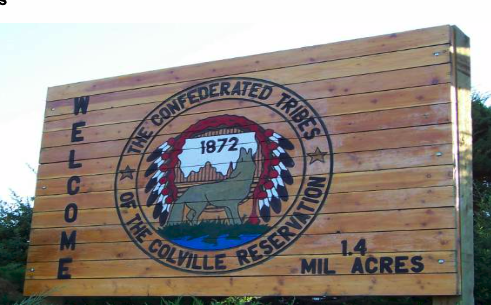
- Details
- By Native News Online Staff
Residents on the Colville Indian Reservation were breathing a sigh of relief this weekend after three suspects were arrested on Friday after the reservation was rocked by the news of two killings on Thursday in the Keller District, one of the reservation’s residential communities.
On Thursday, Colville Tribal Police officers responded to a shooting call in Keller. Once on the shooting scene, tribal officers found two people dead. A tribal officer pursued a vehicle that was seen leaving the shooting scene. While in pursuit, the unidentified Colville Tribal officer was shot in the arm.
According to a news release issued by the Confederated Tribes of the Colville Reservation, the tribal officer sustained a non-life threatening injury. The identity of the officer was not announced.
Two suspects, Curry Pinkham and Zachary Holt, were arrested on Friday morning. A third unidentified suspect was taken into custody later on Friday.
After the arrests were made, Colville Confederated Tribes Chairman Jarred-Michael Erickson sought to reassure Colville tribal citizens late Friday by telling them it was safe to return to their normal activities.
He also said details of the tragic events are still being assembled as law enforcement continues its investigation.
“I also want to thank our community, including our tribal members and non-tribal residents. This has been a difficult time…but despite the worry and disruption, our community banded together. Many people called in tips and helped law enforcement make these arrests. We grieve the loss of life and pray for the families of the victims,” Erickson said.
Ten law enforcement agencies, including the FBI, Washington State Police and Border Patrol, assisted in the investigation and arrests of the suspects.
Police have not released motives for the two killings.
The Colville Indian Reservation is located in the northeastern part of the state of Washington. The Confederated Tribes of the Colville Reservation reports it has 9,432 enrolled tribal citizens.
More Stories Like This
Native News Weekly (August 25, 2024): D.C. BriefsUS Presidents in Their Own Words Concerning American Indians
Native News Weekly (December 14, 2025): D.C. Briefs
Wounded Knee Massacre Site Protection Bill Passes Congress
Two Murdered on Colville Indian Reservation
Help us defend tribal sovereignty.
At Native News Online, our mission is rooted in telling the stories that strengthen sovereignty and uplift Indigenous voices — not just at year’s end, but every single day.
Because of your generosity last year, we were able to keep our reporters on the ground in tribal communities, at national gatherings and in the halls of Congress — covering the issues that matter most to Indian Country: sovereignty, culture, education, health and economic opportunity.
That support sustained us through a tough year in 2025. Now, as we look to the year ahead, we need your help right now to ensure warrior journalism remains strong — reporting that defends tribal sovereignty, amplifies Native truth, and holds power accountable.
 The stakes couldn't be higher. Your support keeps Native voices heard, Native stories told and Native sovereignty defended.
The stakes couldn't be higher. Your support keeps Native voices heard, Native stories told and Native sovereignty defended.
Stand with Warrior Journalism today.
Levi Rickert (Potawatomi), Editor & Publisher


